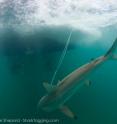New study suggests angler education can benefit sharks
A new study finds fisher education can help protect vulnerable shark populations. The research, led by University of Miami (UM) Rosenstiel School of Marine and Atmospheric Science scientists, showed that recreational anglers were more supportive of shark management and conservation if they had prior knowledge of shark conservation. "The recreational fishing community has a long history of supporting marine conservation efforts, so there is great value in trying to understand which factors affect their behavior and decision making, especially for threatened species such as sharks," said Austin Gallagher, UM adjunct assistant professor and lead author of the study.
The researchers interviewed 158 recreational anglers in South Florida about their attitudes towards shark conservation. The found that many catch-and-release anglers recognized that sharks can suffer from post-release mortality but it is still an under-appreciated consequence, particularly for species that are inherently sensitive, such as hammerheads. The data also revealed that many recreational anglers are supportive of marine protected areas for threatened shark species, however that climate change is a larger perceived threat to sharks than recreational fishing.
"Anglers generally care about shark conservation, but are unaware of some potential threats from recreational fishing and how they can best modify their angling techniques to improve survivorship of released sharks," said co-author Neil Hammerschlag, research assistant professor at the UM Rosenstiel School and UM Abess Center for Ecosystem Science and Policy.
According to the authors, the findings suggest a need for increased education and outreach on the impacts of catch-and-release angling on sharks to improve survival rates and conservation of threatened sharks.
"Our study identifies important disconnects between existing scientific evidence on the impacts of recreational fishing on certain shark species and existing conservation beliefs among anglers," said Gallagher. "This is a good starting point for new conversations on sustainability within the fishing community."
Source: University of Miami Rosenstiel School of Marine & Atmospheric Science
Other sources
- Study: Angler education can help protect sharksfrom UPIWed, 25 Nov 2015, 21:40:19 UTC
- Angler education can benefit sharksfrom Science DailyWed, 25 Nov 2015, 15:40:23 UTC
- New study suggests angler education can benefit sharksfrom PhysorgWed, 25 Nov 2015, 13:00:16 UTC
